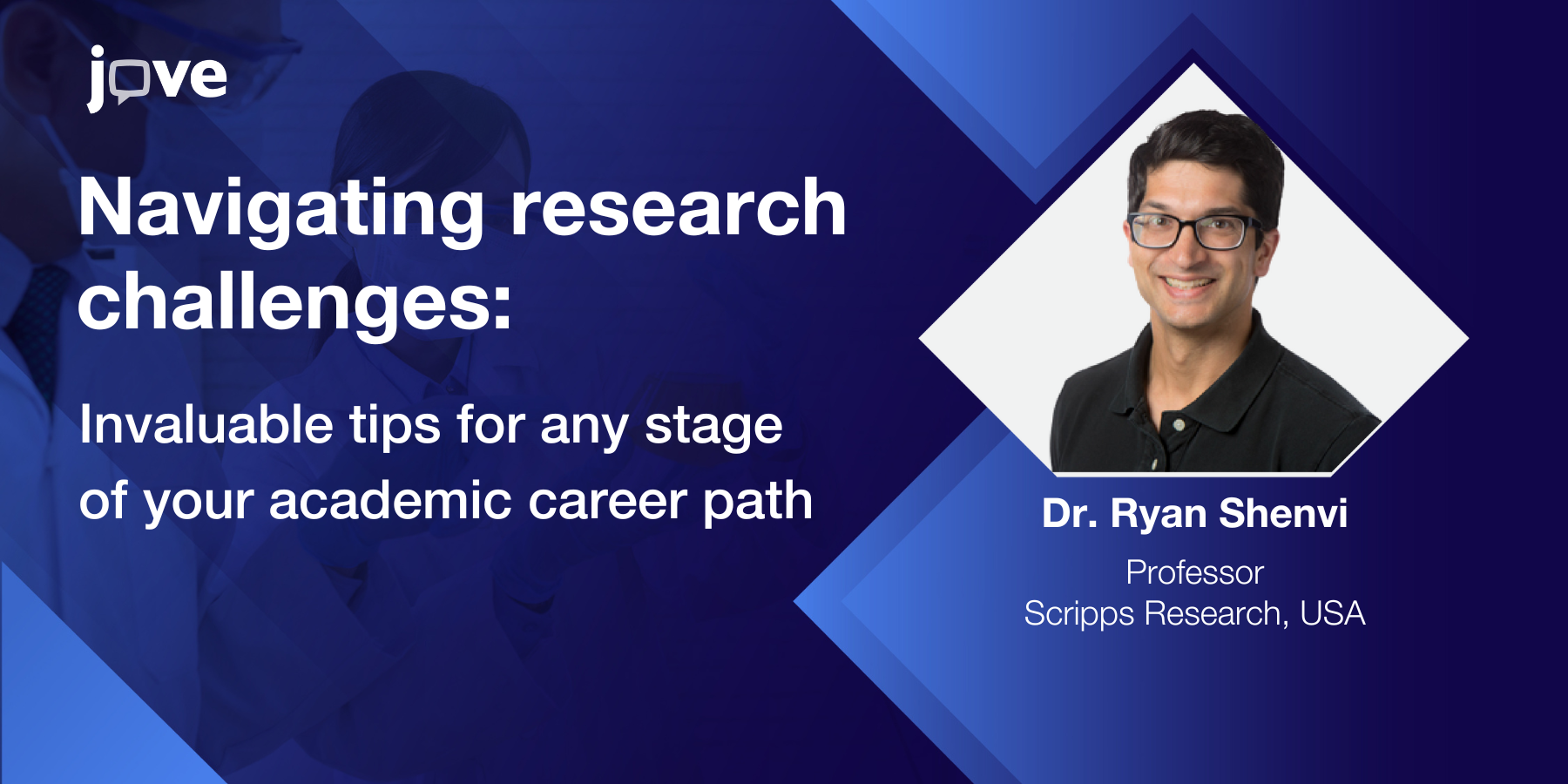Carving out a career as a researcher is no easy feat, with major challenges facing hopeful scientists at all stages of the career ladder. From undergraduate students fighting for Ph.D. studentships to postdocs competing for a tenured position, the academic career path is full of bumps and turns. Luckily, early-stage researchers are not alone in their endeavors. Navigating these challenges can be made a bit easier by learning from those who have successfully completed the journey to a professor position.
JoVE recently hosted a webinar with Dr. Ryan Shenvi from Scripps Research for just this reason. Dr. Shenvi is a professor in the Department of Chemistry who has been recognized for his exceptional work in chemical synthesis and catalysis, with applications in neuroscience, amongst others.
In this webinar, Dr. Shenvi shared invaluable insights from his esteemed research career. Here, we reveal his top 5 tips on how to successfully navigate the arduous academic career path.
1. For STEM students, cultivation is more important than topic choice
In a recent poll hosted by JoVE, 30% of respondents said that the biggest challenge they faced in STEM research was choosing the right research topic or field. While for many aspiring STEM students this feels like the single decision that will dictate the entirety of their future career, Dr. Shenvi thinks otherwise. Rather, the project that you choose is like a seed, it starts small and insignificant. The final destiny of this seed is governed by how it is cultivated through continuous development. He believes the impact of one’s research depends on the cultivation more than the initial inception point (topic).
He says picking a research area can be made easier by choosing an area that you both enjoy, but also one that you are skilled at. A research topic that feels burdensome, or that you feel is not suited to your skillset, will make it difficult to remain in long enough to cultivate a fruitful career. Choose a topic that you enjoy and then focus on cultivating that seedling into a fertile research career through continuous development.
2. Improve productivity in the lab by confronting your weaknesses
Pursuing a Ph.D. is one of the most challenging stages of the academic career path. It often represents the first time a student will have full ownership over a major project, and the first time working independently in a paid position. Juggling all of the tasks that go alongside a Ph.D. program, including running experiments, analyzing data, and writing papers, requires efficient and productive work.
Dr. Shenvi discussed his recommendations to improve productivity in research based on his 20 years of experience as an academic researcher. Firstly, students should identify and confront their weaknesses, and then purposely work to improve upon them. Secondly, Dr. Shenvi refers to Nobel laureate E.J. Corey's laboratory rules as great practices to implement for improved productivity and better science within the lab.
E.J. Corey's Laboratory Rules
- Work Thoughtfully
- Work Safely
- Work Efficiently
- Communicate Well
- Keep Learning
- Be Skeptical of Your Assumptions
- Make Judicious and Logical Choices
3. Be cautious of multitasking
Multitasking is often suggested to Ph.D. students as an approach to juggling their overflowing workload. Yet, Dr. Shenvi believes that it is often impossible to do two tasks well at the same time, and therefore any increase in productivity with multitasking comes at the expense of quality. Rather than splitting time between two tasks, do each task individually and with 100% effort for the best result.
4. Embrace failure
A research career is built on failure, and a lack of it suggests that the project is under-ambitious or deficient in novelty. While Dr. Shenvi believes that scientific research is 95% failure, this is hidden by the fact that people, and exacerbated by social media, only report on their successes and latest publications. At times of struggle and failed experiments, it can be even more challenging to see peers achieving success. In these times it is essential to keep focused on the research, embrace failure as a characteristic of an ambitious project, and don't be intimidated by success around you.
5. Postdocs: look in the dark corners for impactful projects
As later stage researchers, post-doctoral researchers should be seeking impactful projects to solidify their academic career path. A common route is to jump into the latest topic emerging as the next potential breakthrough in science. Instead, Dr. Shenvi suggests taking a more creative approach, by looking into the dark corners of science where no one else is looking.
Carving out a niche project can be achieved by combining two smaller scientific areas, creating a new field where the postdoc can flourish as the leading expert.
Learn more best practices for STEM researchers at various career stagesMany more tips and best practices for navigating the challenges of STEM research were shared in this gold-mine webinar with Dr. Shenvi. Whether you are an undergraduate student contemplating a career in research, or a postdoc taking the next step in your academic career path, make sure to watch the full webinar, free of charge, here. |

